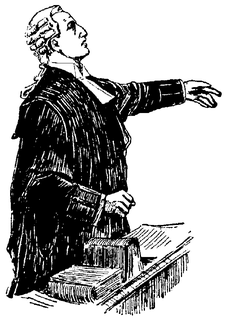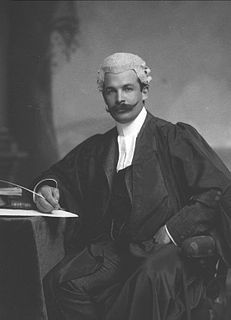
A barrister is a type of lawyer in common law jurisdictions. Barristers mostly specialise in courtroom advocacy and litigation. Their tasks include taking cases in superior courts and tribunals, drafting legal pleadings, researching the philosophy, hypothesis and history of law, and giving expert legal opinions.

A lawyer or attorney is a person who practices law, as an advocate, attorney at law, barrister, barrister-at-law, bar-at-law, canonist, canon lawyer, civil law notary, counsel, counselor, counsellor, solicitor, legal executive, or public servant preparing, interpreting and applying law, but not as a paralegal or charter executive secretary. Working as a lawyer involves the practical application of abstract legal theories and knowledge to solve specific individualized problems, or to advance the interests of those who hire lawyers to perform legal services. The role of the lawyer varies greatly across different legal jurisdictions.

Business is the activity of making one's living or making money by producing or buying and selling products. Simply put, it is "any activity or enterprise entered into for profit."
An attorney at law in the United States is a practitioner in a court of law who is legally qualified to prosecute and defend actions in court on the retainer of clients. Alternative terms include counselor and lawyer. As of April 2011, there were 1,225,452 licensed attorneys in the United States. A 2012 survey conducted by LexisNexis Martindale-Hubbell determined 58 million consumers in the U.S. sought an attorney in the last year and that 76 percent of consumers used the Internet to search for an attorney.
Consumer privacy is information privacy as it relates to the consumers of products and services.
A paralegal is the professional that performs procedures autonomously or semi autonomously, as part of a legal assistance system. Performs tasks that require understanding of the legislation for its proper execution. They also work in support or assist professionals related to the legal area of a consultative or judicial litigation nature. Its labor market is broad, including consultancies, companies that have legal departments or that perform legislation compliance activities such as: environmental, labor, controlled products, product registration, trademarks and patents, tax, bidding, among others. Legal offices and public bodies also have many paralegals in support activities although they do not yet use the correct name of the profession.
A conflict of interest (COI) is a situation in which a person or organization is involved in multiple interests, financial or otherwise, and serving one interest could involve working against another. Typically, this relates to situations in which the personal interest of an individual or organization might adversely affect a duty owed to make decisions for the benefit of a third party.
A consultant is a professional who provides expert advice in a particular area such as business, education, law, regulatory compliance, human resources, marketing, finance, health care, engineering, science, security, or any of many other specialized fields.
A law firm is a business entity formed by one or more lawyers to engage in the practice of law. The primary service rendered by a law firm is to advise clients about their legal rights and responsibilities, and to represent clients in civil or criminal cases, business transactions, and other matters in which legal advice and other assistance are sought.
A trademark attorney or trade mark attorney or agent is a person who is qualified to act in matters involving trademark law and practice and provide legal advice on trade mark and design matters.
A mortgage broker acts as an intermediary who brokers mortgage loans on behalf of individuals or businesses.
Legal outsourcing, also known as legal process outsourcing (LPO), refers to the practice of a law firm or corporation obtaining legal support services from an outside law firm or legal support services company. When the LPO provider is based in another country, the practice is called offshoring and involves the practice of outsourcing any activity except those where personal presence or contact is required, e.g. appearances in court and face-to-face negotiations. When the LPO provider is based in the same country, the practice of outsourcing includes agency work and other services requiring a physical presence, such as court appearances. This process is one of the incidents of the larger movement towards outsourcing. The most commonly offered services have been agency work, document review, legal research and writing, drafting of pleadings and briefs, and patent services.
Executive search is a specialized recruitment service which organizations pay to seek out and recruit highly qualified candidates for senior-level and executive jobs across the public and private sectors, as well as non-profit organizations. Headhunters may also seek out and recruit other highly specialized and/or skilled positions in organizations for which there is strong competition in the job market for the top talent, such as senior data analysts or computer programmers.
A law firm network is a membership organisation consisting of independent law firms. These networks are one type of professional services networks similar to networks found in the accounting profession. The common purpose is to expand the resources available to each member for providing services to their clients. Prominent primarily law firm networks include: CICERO League of International Lawyers, First Law International, Alliott Group (multidisciplinary), Lex Mundi, WSG - World Services Group (multidisciplinary), TerraLex, Meritas (law), Multilaw, The Network of Trial Law Firms, Inc., the State Capital Group, and Pacific Rim Advisory Council. The largest networks have more than 10,000 attorneys located in hundreds of offices worldwide.
Manufacturing in Mexico grew rapidly in the late 1960s with the end of the US farm labor agreement known as the bracero program. This sent many unskilled farm laborers back into the Northern border region with no source of income. As a result, the US and Mexican governments agreed to The Border Industrialization Program, which permitted US companies to assemble product in Mexico using raw materials and components from the US with reduced duties. The Border Industrialization Program became known popularly as The Maquiladora Program or shortened to The Maquila Program.
Professional liability insurance (PLI), also called professional indemnity insurance (PII) but more commonly known as errors & omissions (E&O) in the US, is a form of liability insurance which helps protect professional advice- and service-providing individuals and companies from bearing the full cost of defending against a negligence claim made by a client, and damages awarded in such a civil lawsuit. The coverage focuses on alleged failure to perform on the part of, financial loss caused by, and error or omission in the service or product sold by the policyholder. These are causes for legal action that would not be covered by a more general liability insurance policy which addresses more direct forms of harm. Professional liability insurance may take on different forms and names depending on the profession, especially medical and legal, and is sometimes required under contract by other businesses that are the beneficiaries of the advice or service.
Legal professions in England and Wales are divided between two distinct branches under the legal system, those of solicitors and barristers. Other legal professions in England and Wales include acting as a judge, as the Attorney-General, as a Solicitor-General, or as the Director of Public Prosecutions.

Professional services networks are business networks of independent firms who come together to cost-effectively provide professional services to clients through an organized framework. They are principally found in law and accounting. They may also be found in investment banking, insurance, real estate and architectural services. Any profession that operates locally, but has clients in multiple locations, are potential members of a network. This entry focuses on accounting, legal, multidisciplinary and specialty practice networks. Today members of these networks employ more than one million professionals and staff and have cumulative annual revenues that exceed $200 billion.
The legal services sector of the United Kingdom is a significant part of the national economy; it had a total output of £22.6 billion in 2013, up from 10.6 billion in 2001, and is equivalent to 1.6% of the country's gross domestic product for that year. The sector has a trade surplus is £3.1 billion in 2013 and directly employees 316,000 people, two-thirds of whom are located outside London. The UK is the world's most international market for legal services. It allows virtually unrestricted access for foreign firms, resulting in over 200 foreign law firms with offices in London and other cities in the UK. Around half of these are US firms, with the remainder mainly from Europe, Australia and Canada. The UK legal market has a strong global position due to the popularity of English law. Some 27% of the world's 320 legal jurisdictions use English Common law.



